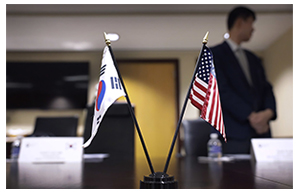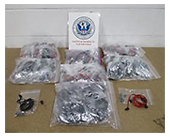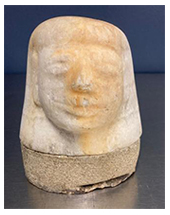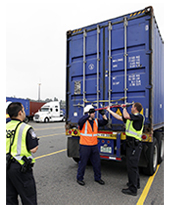In this Update
Message from the Deputy Assistant Commissioner
CBP Access is an electronic newspage developed by the Office of Congressional Affairs for Members of Congress and staff. If you are interested in subscribing to the CBP Access email distribution list, please send an email to OCAInquiry@cbp.dhs.gov.
July and August were hallmark months for CBP’s trade facilitation and enforcement mission starting with the agency’s first CBP Trade Facilitation and Cargo Security Summit in Anaheim, California. With more than 3,000 attendees from across the trade community – 1,000 on-site and 2,000 virtually – it was the first time since the pandemic that CBP was able to hold a trade event of this magnitude. August also marked the 10th anniversary of CBP’s entry into force of the U.S.-Korea Free Trade Agreement and kicked off the back-to-school shopping season for many American families and educators. This year, CBP teamed up with the U.S. Chamber of Commerce to educate unsuspecting consumers on how to avoid scammers looking to take advantage of the busy time by selling fake and potentially dangerous counterfeit products.
–Stephanie Talton, Deputy Assistant Commissioner, Office of Congressional Affairs
CBP Hosts First Trade Summit
CBP recently gathered with its trade partners for the agency’s first Trade Facilitation and Cargo Security Summit. The summit was held from July 18-20 in Anaheim, California, and combined two of CBP’s signature trade events – the annual trade symposium and the Customs Trade Partnership Against Terrorism (CTPAT) conference. It was also the first time CBP had hosted a large in-person trade event since the pandemic began two-and-a-half years ago. The three-day event focused on the multitude of challenges facing the trade community as well as CBP’s forward-looking strategy to address the constantly changing trade environment.
Forced Labor
The summit highlighted CBP’s commitment to leading the global fight against forced labor and the agency’s continuing efforts to evaluate and improve its targeting processes and overall enforcement posture. In his remarks during the summit, Commissioner Magnus stated, “So far in fiscal year 2022, CBP has detained approximately 2,000 shipments worth an estimated $358 million for suspected forced labor.” Magnus also noted that CBP is not only prohibiting products suspected of having been produced with forced labor from entering the United States but is also engaging with foreign entities to remediate forced labor condition instigating real change for thousands of workers around the world. CBP continues to work in close partnership with the trade community in the implementation of forced labor enforcement programs, including the Uyghur Forced Labor Prevention Act, to minimize disruptions to legitimate goods and supply chains.
CBP Green Trade Strategy and Global Engagement
CBP’s Green Trade Strategy was one of the numerous agency initiatives Commissioner Magnus highlighted during his opening remarks. The strategy is aimed at lowering carbon emissions and addressing the impacts of climate change as it relates to trade. Commissioner Magnus introduced the strategy as a key CBP trade priority and stressed the importance of advancing environmental protection efforts in conjunction with our international counterparts and industry partners.
Discussing how global engagement is imperative to effective trade enforcement and facilitation, Commissioner Magnus shared CBP’s intent to nominate Ian Saunders as the U.S. candidate for Secretary General of the World Customs Organization, an independent, international body dedicated to improving the effectiveness and efficiency of customs organizations. Mr. Saunders, currently a Deputy Assistant Secretary at the U.S. Department of Commerce, has more than 30 years’ experience in customs and international trade. As the moderator for the summit’s customs capacity building session, Mr. Saunders discussed the importance of a global perspective as it relates to trade facilitation, especially in a trade environment focused on post-pandemic economic recovery. “Trade facilitation is something that reduces the costs of trade,” said Saunders. “It has a significant impact on the decisions that companies make about where they want to invest, how and what the global supply chains will look like, and where they’ll be located.”
21st Century Customs Framework
Another summit panel focused on the 21st Century Customs Framework, a CBP initiative that addresses current and future trade challenges and modernization barriers. CBP is cognizant of the need to stay modern to meet the challenges of an evolving trade landscape. New actors, industries, and modes of conducting business have emerged, disrupting the traditional global supply chain. The panel discussed how it has been nearly three decades since the last major, comprehensive overhaul of customs authorities and how the landscape in which CBP and the trade industry operates has changed drastically. The 21st Century Customs Framework seeks to achieve end-to-end supply chain transparency; drive data-centric decision-making; and identify and allocate risk to appropriate parties. AnnMarie Highsmith, the executive assistant commissioner for CBP’s Office of Trade, further elaborated on the 21st Century Customs Framework initiative during the summit. “The 21st Century Customs Framework is our holistic effort to update our authorities, policies, and regulations. We want to ensure that we are not just keeping up with the Joneses, but that we are the Joneses in the international trade arena,” said Highsmith.
Cybersecurity and Trade
Another summit session focused on cybersecurity in the trade environment. Panelists spoke about the scope of the issue, CBP’s current level of preparedness, and the steps the trade community can take to protect their companies from cyberattacks. The frequency of cybersecurity attacks is staggering. Assistant Commissioner Sanjeev Bhagowalia, CBP’s chief information officer, noted that CBP’s sees almost 100 million attempts on its systems every day. The attackers seek to infiltrate industry systems as well. CBP’s deputy chief information security officer, D. Scott Davis, also remarked during the session that according to intelligence reports, “supply chain compromises were up 48% in 2020 as well.”
Operational Trade Advancements
In terms of operational trade advancements, Diane Sabatino, the deputy executive assistant commissioner of the Office of Field Operations, spoke at the summit about a new system – the Vessel Entrance and Clearance System – that will digitize and automate the entry and clearance process for vessels. “With the automation, we are forecasting that CBP will save thousands of man hours,” Sabatino noted, “which will allow us to focus our resources on threats where we need to be hands-on.” Sabatino also talked about technological advancements in CBP’s trade processing operations such as the scheduling of perishable goods inspections using the CBP One™ mobile application.
20 Years of CTPAT
The final day of the summit was devoted to Customs-Trade Partnership Against Terrorism (CTPAT). A series of panel discussions were held with topics ranging from an overview of the CTPAT program to presentations on virtual validations, recent smuggling trends and minimum security criteria to a workshop on CTPAT’s trade compliance program and forced labor requirements.
Created with just seven companies in the wake of the September 11, 2001, terrorist attacks, CTPAT now has more than 11,000 members and led the way for the creation of the SAFE Framework of Standards at the World Customs Organization and the expansion of the concept of the Authorized Economic Operator. CTPAT is, “a partnership program that is the foundation of CBP’s layered strategy for security. The layered strategy includes such things as advanced electronic data, automated systems, our National Targeting Center, the Container Security Initiative, and the deployment and use of non-intrusive inspection equipment,” said Thomas Overacker, the executive director of CBP's cargo and conveyance security division. The CTPAT program, “fundamentally changed the relationship between government and the trade community. We went from a relationship of regulator and regulatee to a relationship of true public-private partnership.”
Commissioner Magnus also gave glowing praise to CTPAT. “This program continues to be one of our most valuable partnerships that we have with industry. And by taking the steps to become CTPAT members, you’re not only bolstering our security capabilities, but you also help us to take a risk-based approach to facilitate cargo into the country,” said Magnus, noting that the program’s current compliance rate of 99% is the highest level it has ever been.
Customs Signing Ceremony
One of the highlights of the summit was the signing of a mutual recognition arrangement between CBP and the customs administration of Uruguay as well as the signing of joint work plans with the customs administrations of Guatemala and Colombia. A mutual recognition arrangement is a bilateral understanding between two customs administrations, which provides a platform for the exchange of membership information and recognizes the compatibility of the respective supply chain security programs. That program is CTPAT for CBP. With the signing, CBP now has 15 mutual recognition arrangements with other countries including one accounting for multiple countries with the European Union. A joint work plan is a document that lays out the path toward mutual recognition between two customs administration’s supply chain security programs. At the conclusion of a joint work plan, both customs administrations decide if a mutual recognition arrangement is feasible and should be pursued.
Back-to-School: Business and Law Enforcement Team Up to Protect Students, Parents, and Teachers from Counterfeit Goods
CBP joined forces with the U.S. Chamber of Commerce this summer to raise awareness about the dangers of counterfeit goods by providing ten tips to “Shop Smart” for back-to-school basics. Counterfeiters take advantage of the busy time by luring customers with convincing advertisements and low prices, but shoddy or potentially harmful products and materials are not worth the risk. Fake backpacks, pencils, and electronics threaten students’ safety and cost parents more money over time.
Leaders across government and the business community understand the dangers of counterfeits and are taking action to protect customers. For example, Nike Inc. donated proprietary technology to CBP via its Donations Acceptance Program to aid in authenticating a variety of its merchandise and prevent counterfeit products from entering the United States. CBP rigorously enforces intellectual property rights on imported products and, as of August 2022, has made almost 17,000 seizures of counterfeit goods worth an estimated $2.4 billion, had the goods been genuine. However, businesses and CBP cannot do it alone. Counterfeit products cost the global economy over $500 billion a year. That is why the Chamber of Commerce partnered with CBP to raise awareness nationwide to educate Americans – especially back-to-school shoppers – about the dangers of counterfeits.
Customs Commissioners Commemorate 10-Year Anniversary of U.S.-Korea Free Trade Agreement
On August 5, 2022, CBP Commissioner Chris Magnus met with Korea Customs Service Commissioner Mr. Yoon, Tae-sik for the 17th U.S.-Korea Customs leadership meeting in Washington D.C. The meeting was held in commemoration of the 10th anniversary of CBP’s entry into force of the U.S.-Korea Free Trade Agreement.
The two customs authorities discussed cooperation to expand trade between the two countries, ensure joint trade facilitation and supply chain security, and block dangerous goods at the border. They also discussed and agreed on ways to improve the performance and utilization of the U.S.-Korea Free Trade Agreement, cooperation in risk management such as the exchange of marine cargo information, and cooperation in the Container Security Initiative (CSI). The Container Security Initiative is a program operated by CBP in cooperation with customs authorities around the world to inspect container cargo shipments scheduled to arrive in the U.S. CSI Busan has been operational since 2003, and the two customs authorities agreed to start work to expansion of the operating framework of CSI Busan.
The two customs authorities also discussed the significant expansion of trade volumes between the two countries over the past decade due to the U.S.-Korea Free Trade Agreement, agreed in principle to pursue a data-sharing arrangement for risk management of cargo across both borders, and agreed to establish a communication channel between CBP and Korea Customs Service to quickly share and resolve difficulties related to import and export issues and concerns raised by private companies in both countries.
Enforcement News from Across CBP
CBP Officers at the Champlain Port of Entry Seize Counterfeit Beats Earphones
Buffalo, NY — CBP officers from the Champlain Port of Entry Cargo Facility intercepted a shipment of counterfeit Beats earphones. During a shipment examination, officers discovered zip lock bags of wired earphones located within the shipment. A physical inspection of the items revealed Beats Tour earphones that appeared to be of poor quality with no labels or invoices. In coordination with the Electronics Center of Excellence and Expertise, it was determined that the items were counterfeit and violated the Intellectual Property Rights (IPR) of the manufacturer. Furthermore, CBP Import Specialists helped to determine the earphones had a total Manufacturers Suggested Retail Price (MSRP) value of more than $25,000.
CBP Officers in Memphis Intercept Ancient Egyptian Artifact
Memphis, TN — On August 17, CBP at the port of Memphis intercepted an ancient Egyptian artifact shipped from Europe. The shipment was manifested as an antique stone sculpture and sent from a dealer to a private buyer in the United States. CBP worked with subject matter experts at the University of Memphis Institute of Egyptian Art and Archaeology to determine that the artifact was authentic. It is an Egyptian canopic jar lid of the funeral deity named Imsety. Canopic jars were used to hold the internal organs of mummies and Imsety specifically protected the deceased’s liver. The lid is likely from the Egyptian Third Intermediate Period, 1069 BC to 653 BC, making it potentially 3,000 years old. The artifact is on a list of items protected by bilateral treaties and falls under the Convention on Cultural Property Implementation Act of 1983. The item was turned over to Homeland Security Investigations for further investigation.
CBP Officers in New Mexico Seize Counterfeit Solar Panels
Santa Teresa, NM — CBP officers working at the Santa Teresa port of entry recent intercepted a shipment of counterfeit solar panels with a Manufacturer Suggested Retail Price of $1,420,856.64. On July 4, CBP officers working at the Santa Teresa cargo facility conducted an operation focused on solar products and IPR infringements. During the operation, CBP officers targeted a shipment of solar panels deriving from Vietnam for potential IPR violation and placed the merchandise on hold for examination. The shipment was carefully examined and on July 15, the merchandise was declared to be counterfeit by the rightful trademark owner. A total of 9,072 crystal silicone photocell modules were seized pursuant to 19 USC 1526(E), as implemented by 19 CFR 133.21
Office of Congressional Affairs | August 2022











